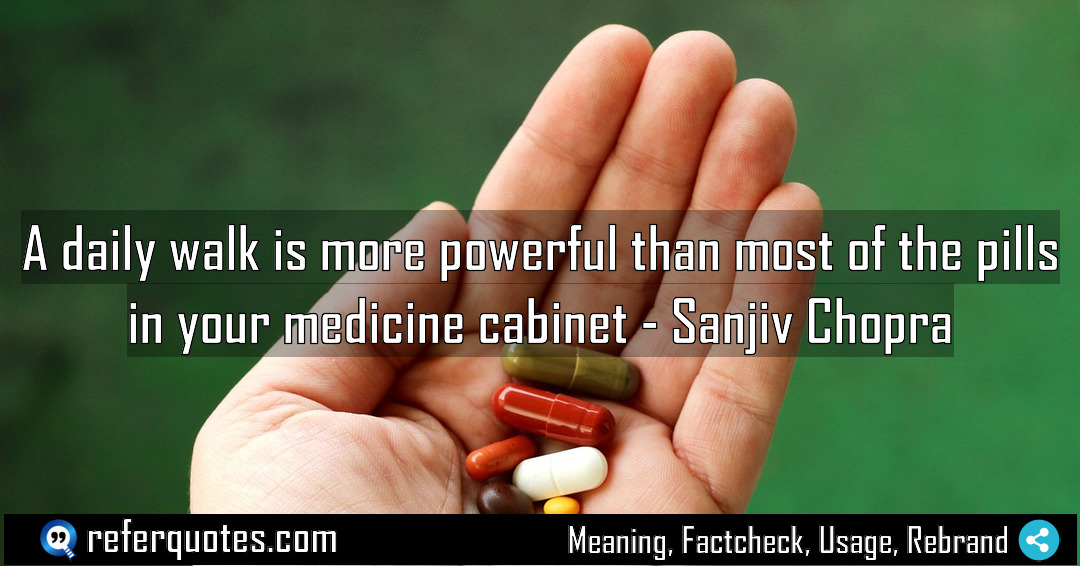
You know, “A daily walk is more powerful than most of the pills” isn’t just a nice sentiment. It’s a profound truth backed by decades of clinical evidence. Let’s break down why this simple act is such a powerhouse.
Share Image Quote:
Table of Contents
- Meaning
- Explanation
- Origin & Factcheck
- Context
- Usage Examples
- FAQ
Meaning
This quote cuts through the noise. It’s saying that for preventing and managing a huge range of chronic diseases, the simple, consistent, and free act of walking is often more effective and has fewer side effects than the medications we so readily reach for.
Explanation
Look, I’ve seen it firsthand. We get so focused on complex solutions—the latest drug, the newest supplement. But the data on walking is just staggering. It’s not an exaggeration. A daily walk is a systemic intervention. It regulates blood sugar almost as well as some diabetic medications, it lowers blood pressure, it’s a potent antidepressant, it improves lipid profiles, and it reduces systemic inflammation—the root of so many modern diseases. And the best part? The side effect profile is fantastic: better sleep, more energy, clearer thinking. Pills typically target one pathway, one issue. Walking recalibrates the entire system. It’s the ultimate multi-tool for health.
Quote Summary
Reading Level65
Aesthetic Score82
Origin & Factcheck
This specific phrasing comes straight from Dr. Sanjiv Chopra’s 2012 book, “Doctor Chopra Says,” co-authored with Alan Lotvin and David Fisher. You’ll sometimes see it misattributed to older philosophers or general wellness gurus, but its power lies in its origin—a respected Harvard Medical School professor making a bold, evidence-based claim from a position of authority.
Attribution Summary
Author Bio
Dr Sanjiv Chopra is an American physician, hepatologist, and professor of medicine (emeritus) at Harvard Medical School. He served as Faculty Dean for Continuing Medical Education at Harvard and practiced at Beth Israel Deaconess Medical Center. He writes and speaks on wellness, purpose, longevity, and leadership. The Dr Sanjiv Chopra book list features Leadership by Example, Dr. Chopra Says, The Big Five, The Two Most Important Days, and Brotherhood with his brother Deepak Chopra. He continues to mentor clinicians and inspire general readers through keynotes and media.
| Official Website | Facebook | X| Instagram
Where is this quotation located?
| Quotation | A daily walk is more powerful than most of the pills in your medicine cabinet |
| Book Details | Publication Year: 2010; ISBN: 978-0312611742; Last Edition: 1st Edition; Number of Pages: 304. |
| Where is it? | Chapter 4: Movement and Life, Approximate page from 2010 edition |
Context
In the book, this statement isn’t just thrown out there. It’s the conclusion of a chapter dedicated to debunking medical myths and highlighting powerful, underutilized truths. Chopra is positioning this not as folk wisdom, but as a clinical fact that deserves a prime spot in any serious conversation about preventive medicine and public health.
Usage Examples
I use this concept all the time. It’s not about dismissing modern medicine, but about empowering people with the first and best tool they have.
- For a client feeling overwhelmed by health advice: “Forget the complicated stuff for a week. Just focus on this one thing. A daily walk is more powerful than most of the pills in your medicine cabinet. Let’s master that first.”
- For a team struggling with burnout and low energy: “Our most productive ‘meeting’ might be a 20-minute walk. It’s a cognitive reset and a physical tune-up, honestly more potent for our mental clarity than another coffee.”
- For someone pre-diabetic or with borderline hypertension: “Before we even talk about medication, your most important prescription is a consistent daily walk. It directly addresses the root of the issue with zero negative side effects.”
To whom it appeals?
Share This Quote Image & Motivate
Motivation Score90
Popularity Score85
Shareability Score82
FAQ
Question: Is this quote saying I should stop taking my prescribed medication?
Answer: Absolutely not. That’s a dangerous misinterpretation. It means that for *prevention* and as an *adjunct* to prescribed treatment, walking is an incredibly powerful, often under-prescribed tool. Always consult your doctor before making any changes to your medication.
Question: How long of a walk are we talking about?
Answer: The beauty is in the consistency, not the marathon. Most research points to 30 minutes as a sweet spot, but even a brisk 15-20 minute daily walk will deliver massive benefits. The key is daily.
Question: What if I already work out? Does this still apply?
Answer: It does. A structured workout is fantastic. But a daily walk serves a different purpose—it’s low-grade, systemic maintenance. It aids recovery, keeps your metabolism humming throughout the day, and provides a mental break that high-intensity workouts often don’t.
Question: Can a walk really be as powerful as, say, an antidepressant?
Answer: For mild to moderate depression, the clinical data is surprisingly robust. It may not replace medication for everyone, but it’s a powerful first-line intervention and an essential complementary strategy. It changes brain chemistry, reduces stress hormones, and provides a rhythmic, meditative focus.
Similar Quotes
Exercise is the cheapest and most powerful medicine… it’s a truth we see in the data every single day. Forget expensive prescriptions for a moment; the most transformative treatment is…
Wellness is not found in a pill; it’s a powerful reminder that real health isn’t a quick fix. It’s built through consistent, daily habits that create a foundation for lasting…
You know, I’ve been thinking a lot about that line, “Your fork is more powerful than your prescription pad.” It’s one of those ideas that seems obvious once you hear…
You know, the foundation of longevity is built not in medicine… it’s really about those small, daily choices. This is the core insight from Dan Buettner’s work, and honestly, it’s…
You know, the most powerful medicine is belief isn’t just a feel-good phrase. It’s the absolute bedrock of how I’ve seen patients either thrive or just survive. Your mind isn’t…
